To Submerge and Protect
Words by William Nadeau
Specialized in technical, commercial, public safety diving, and underwater investigavite procedures, the RCMP’s Underwater Recovery Team always gets their man

In 1959 a Conservation Officer and his pilot were flying to La Loche, Saskatchewan in a Cessna 180 when something went wrong. The plane crashed somewhere in the middle of Peter Pond Lake, a remote area in the northern part of the province. With little information to go on, the search to locate the aircraft was eventually abandoned, leaving many with questions as to what happened and some still looking for closure. Sixty years later, a side-scan sonar image of a target matching the plane brought a Royal Canadian Mounted Police (RCMP) dive unit back to the area. The team, using a remotely operated vehicle equipped with a video camera, confirmed the plane’s final resting spot. The real difficult work, however, had yet to come. Peter Pond Lake is one of the largest and most exposed bodies of water in the province. The strong winds and the lake’s long fetch combine to generate waves four feet high or more (1.2m+) throughout the summer. Overcoming the logistics to successfully undertake any kind of large-scale search and recovery operation in turbulent lake waters, isolated in the rugged wilderness of Saskatchewan, normally would have been inconceivable. Canadians, however, are a hardy and resilient folk and Mounties always get their man. Add a diver’s psyche to the mix and you have an Underwater Recovery Team prepared to take on any challenge this country’s harsh environment poses.
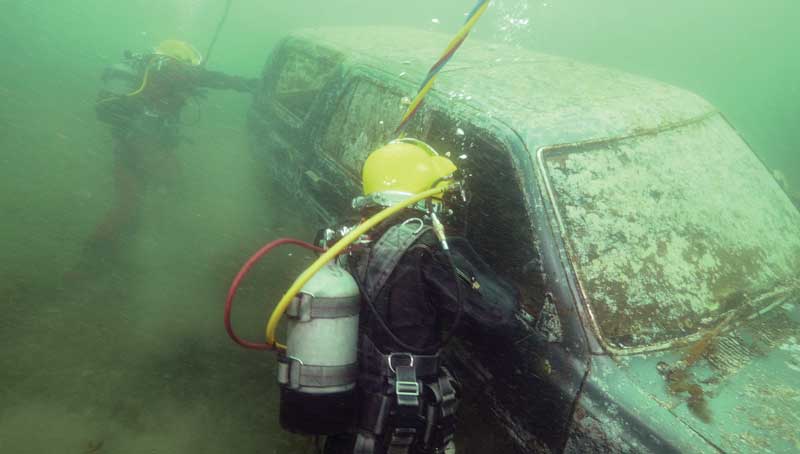
Mandate
Every year, for one reason or another, many people succumb to the watery depths of a cold Canadian lake or one of our oceans. Sometimes their demise is a result of nefarious behaviour; sometimes it is accidental. Regardless, closure for the families and friends of these victims is pivotal. Subsea technology and diver training have evolved tremendously over the last three decades, advancing underwater forensics to new levels. The Royal Canadian Mounted Police Underwater Recovery Team—dubbed ‘URT Members’ by their badge-carrying colleagues—has embraced this new era of diving sciences, subsequently earning a reputation as one of the most competent and qualified police dive units in North America. Not only have they brought closure to many families and friends, they have been instrumental in providing a forensic service for many serious criminal investigations, like the infamous Pickton pig farm murder investigation. The nature of their tasks are diverse: from search and recover operations of tiny bone fragments in contaminated sloughs, to bullets and weapons in four feet (1.2m) of silt at the bottom of a deep, dark cold lake. It may involve the recovery of large vehicles, aircrafts, and sunken vessels, or supporting protective details by clearing, piers, jetties and the hulls of ships for terrorism threats. Whatever their specific mission is, the mandate of the RCMP Underwater Recovery Team (URT) is exactly as their name implies: a unit trained to conduct evidence recovery operations beneath the surface of the water.

Formation
Historically, diving operations involving body or evidence recovery was undertaken ‘unofficially’ and voluntarily by any police officer, first responder, or civilian who owned a tank of compressed air. Using their own dive gear, they were willing to serve their community beyond the call of duty. Like a small village’s fire brigade, a select few compelled by a moral obligation could usually be counted on to help with the gruesome task. It was not until 1977 when the RCMP, under the direction and initiative of Corporal Robert Teather, officially formed a provincially-based dive team. Teather modelled the way not only as a police officer, but also a diver, and had the chops to back up his visionary approach: in 1981 Teather dived into a sinking capsized vessel, rescuing two people and as a result of his efforts he was awarded the Cross of Valour. Teather’s passion and commitment to the program established himself as an international subject matter expert in the industry, publishing books on Underwater Forensics and lecturing to audiences across Canada and the United Sates.
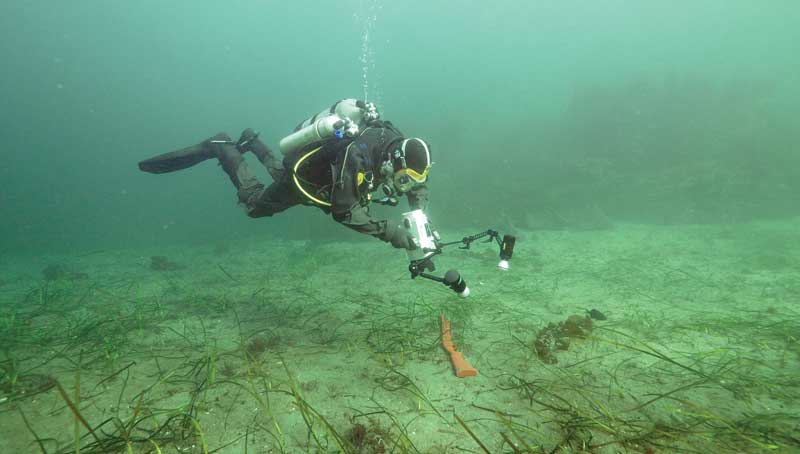
Today
In the mid 1990’s, diving sciences had undergone another technological revolution. Training agencies began expanding their approach to underwater exploration, incorporating innovative equipment and mixed gas breathing systems. This created a paradigm shift and the diving community was suddenly in a position to safely dive deeper, longer, and in increasingly challenging environments. The RCMP embraced this new technology, blending traditional commercial and public safety diving practices with effective technical diving methodology. By 1999, the RCMP appointed a full-time national training coordinator to establish ‘interoperability’, creating a systemic and standardized approach to equipment and training across the country. The results were precedent-setting and six years later the RCMP opened the National Underwater Recovery Training Centre (NURTC) in Nanaimo, Canada’s only dive training centre dedicated to preparing police officers as underwater recovery and forensic specialists.
Today there 72 RCMP diver-trained officers across Canada, assigned to a variety of units from General Duty to Federal Policing, some of whom are full time. When an incident occurs, these members are equipped and ready to respond—to anything. In fact, the RCMP URT attends to around 300 operational calls a year, the length of which ranges from a day to a week or more. A call-out can happen any time of day or night, and when it does, members from across the province—sometimes from across the country—respond. This is not a nine-to-five job and each operation is as unique as the last. When dive team members leave their home units, their colleagues fill in and take on extra duties, often working with minimum crews to keep the communities they serve safe—every recovery mission is a team effort.
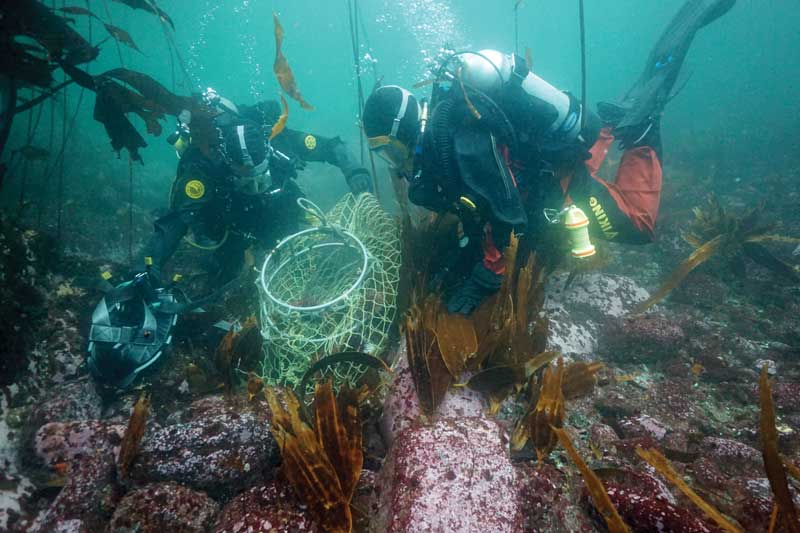
Innovative
Candidates for the RCMP URT program can apply only after they have had a chance to learn the science of policing and gain valuable experience as police officers. Individuals interested in joining the dive team must then undergo an internship with an URT in their region. This is an opportunity for the candidate to discover what is involved and assess if they are prepared to make the commitment—a vital step, as only 9-12 divers across Canada are selected to attend a program that only runs two out of every three years. The induction course (the entry level program) is intensive. It ensures the divers are competent in all aspects of restricted scuba techniques, including basic evidence recovery operations and swift water rescue operations. Over the five weeks of training the candidates will log between 50 and 60 dives and more than 30 hours of bottom time. The RCMP meets and exceeds training standards and certification requirements prescribed by a variety of agencies and specializes in technical, commercial, and public safety diving as well as investigative standards for forensic sciences. Each course focuses on ensuring the team members are competent in meticulously executing every recovery mission. It is not just about locating and bagging an object or a victim; the divers are police officers first and every of piece of evidence must be carefully examined, photographed, surveyed, and preserved in accordance with the expectations of our judicial processes. This is often challenging given the volatile nature of the environment and the complexity of the equipment the divers are using.
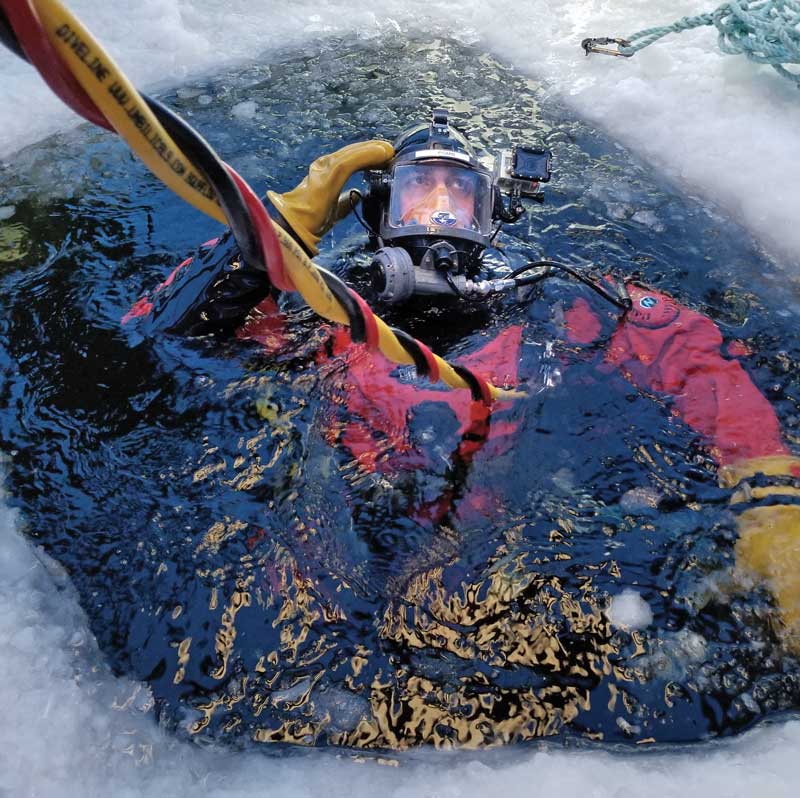
Exceptional
What makes the RCMP URT program exceptional is the ongoing diversity of professional development. As divers continue on in the program, they will receive training in surface supply, marine operations (tactical support), underwater explosive recognition, encapsulated diving, advance crime scene processing, dive supervisor, sledding, ice diving, equipment technician, and even instructor training. In addition to diving operations, many members are trained and equipped to operate a variety of side scan sonar and ROV technology, further expanding the unit’s operational capabilities. Sergeant Jay White joined the RCMP in 1990 and has been with the program since 1999. He is now the program’s National Training Coordinator. He has been tasked in operations in every province and territory in Canada except Manitoba and the Yukon. Over the years he has recognized the need to create a comprehensive program specific to the needs of police diving: “Our ability to provide a collegial-based system for police diving sciences ensures a continuous ongoing education for divers. As a result, we produce professional and highly skilled divers ready to serve Canadians”.
The team of instructors at NURTC maintains high standards and is always exploring new methods of learning, and this does not stop with training. The staff, along with the provincial and local team leaders, constantly research and re-evaluate the equipment used, looking for better ways to do the job and do it safely. A great deal of testing goes into each type of dive gear before it is introduced as standard kit. Every system used is designed to be functional, reliable, and capable of meeting the needs of interoperability (each diver is trained and equipped to the same standard). It begins with the restricted Scuba system, which includes a kit configuration similar to that of a technical diver. Add a full-face AGA mask, a redundant air delivery system with customized isolation and shut-off valves, and through-water communications—and you have the basic infrastructure of a capable recovery diver. Most team members are qualified as unrestricted surface supply divers and trained to use Kirby Morgan diving helmets to depths well past recreational diver limits. All URT members are protected by vulcanized rubber dry suits with neck dams. This isolates them completely from the outside environment, a necessary requirement for contaminated diving operations. On top of all the personal protection equipment, URT divers also need to be comfortable with using cameras, propulsion vehicles, metal detectors, large volume lift bags, body bags, lights, and variety of forensic and surveying tools.
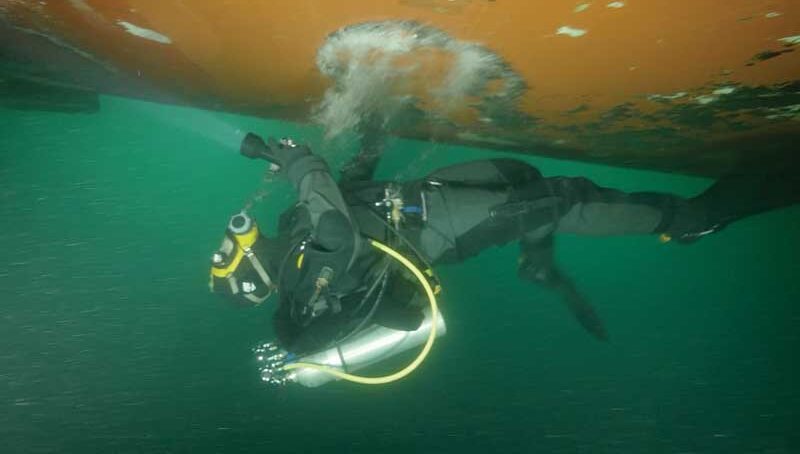
NURTC
The National Underwater Recovery Training Centre is a state-of-the-art facility; its impressiveness is only surpassed by the dedicated commitment of Sergeant White and his team of instructors, who have continued to build upon the legacy started by late Corporal Bob Teather. They have successfully modelled the way, leading others who want to make a difference.
Constable Brandon Hill is currently posted in a small detachment (police station) on Vancouver Island as a General Duty police officer. Prior to joining the RCMP he worked as a recreational diving instructor and was initially reluctant to apply for the URT program, concerned that “the gruesome nature of police diving” might ruin his passion for the sport. Police officers quickly learn to cope with the grim aspects of the job, motivated by the purpose they serve. What resonated for Hill was that same call to duty and how it might apply should he find himself one day looking for closure. “What if it was my child who drowned?” Hill says, “That’s when I realized how important it would be to me”. Hill was one of nine candidates who graduated from the 2019 Induction Program.
Sergeant Andy Pulo is the provincial diving coordinator for Manitoba and the longest active serving member in the Underwater Recovery Program. Over the last 27 years he has dived across the country, including the Arctic. He has seen the program face many hurdles over the years but credits the success of the NURT to the resilience of the team members and the RCMP’s ability to evolve technologically. “Considering the challenges I have faced, [this] job is likely one of the most hazardous that we can do as Mounties,” he says. Despite these challenges, Pulo has no problem identifying the underpinning motivation that has kept him going for as long as has. “I think about all the victims I have been able to return to their families, all the places I have seen and the unique camaraderie shared with other divers. [URT] will most certainly be the one thing I will miss when I leave the force.”
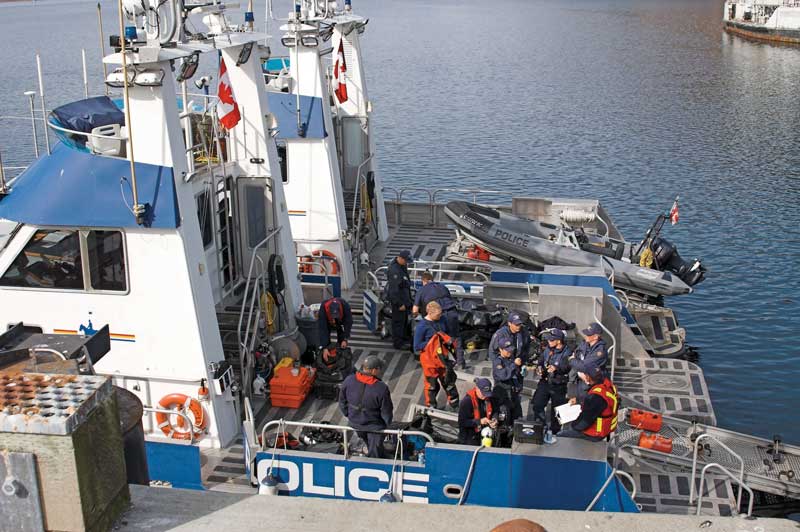
To Serve
It was dedication and a determination to find closure for the family that brought the RCMP dive team back Peter Pond Lake in the middle of January. During the recovery operation the air temperatures dropped below -22ºF (-30ºC) and the water temperatures were freezing; however, this is when the ice is thickest. With the lake frozen, the team was not hampered by rough waters or current, even with the blistering winter winds. Despite extreme temperatures and the additional efforts required to establish a base of operations to support a surface-supply operation, this was the only way to complete the mission and recover the men who had been missing for 60 years. Three days after arriving on site, URT members from three different provinces successfully recovered the bodies of the two men and returned them to their families along with some unique personal items. Before the leaving the site, the divers laid a flag over the crash site to honour the pilot’s service in the Second World War and the passenger’s service as a Conservation Officer.
For a URT member, the mission might result in closure for a family, finding the crucial piece of evidence that identifies a killer or exonerates an innocent person, recovering drugs, locating submerged explosives, or even raising a plane or vessel after a horrific crash. These missions usually end well after dark, and the lengthy day is always followed by a long night of packing gear and completing investigative notes. After the support crews, assisting agencies, media, crowds, and family have left, the divers can still be found at the scene. There are very few accolades shared with the team, perhaps a handshake from a local citizen or a hug from the victim’s next-of-kin. Although the divers are exhausted after a long recovery assignment, their exhaustion mingles with a sense of pride and accomplishment. This is the reward for putting in countless hours of training: the privilege of serving their community in way very few other Canadians can.
Bill Nadeau is a member of the Royal Canadian Mounted Police, has served on the Underwater Recovery Team and is currently posted with the West Coast Marine section. He is also a Fellow of a Royal Canadian Geographical Society and has been involved in the technical and commercial diving industry for over 30 years
Leave a Comment







